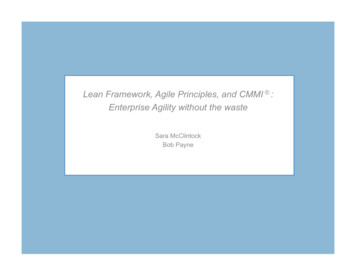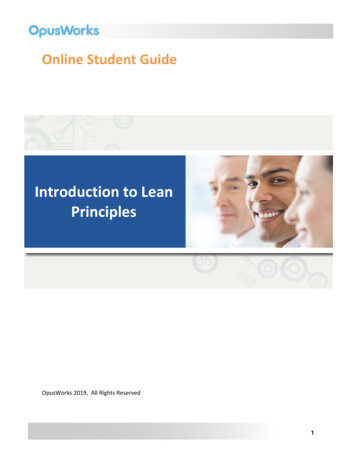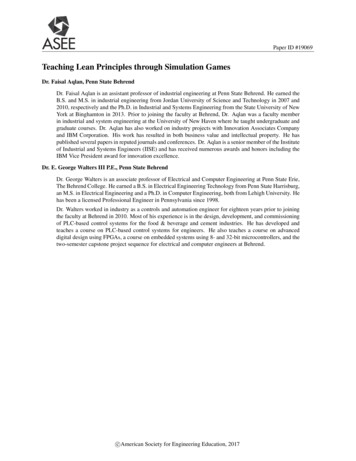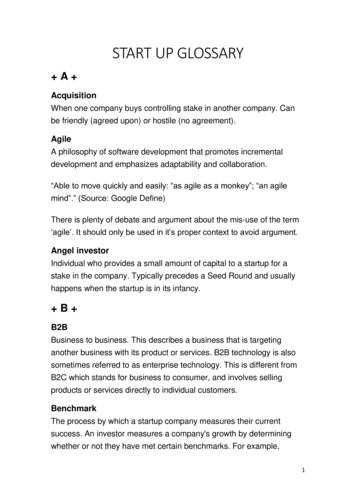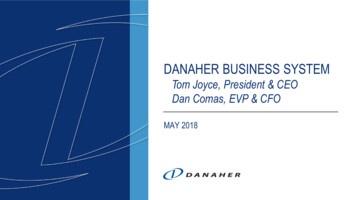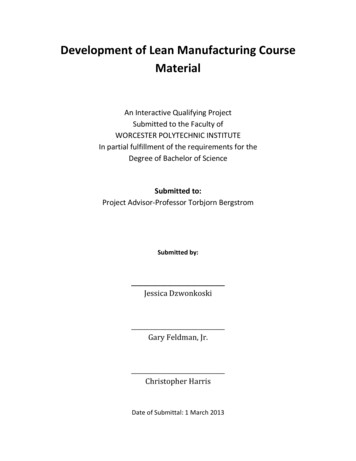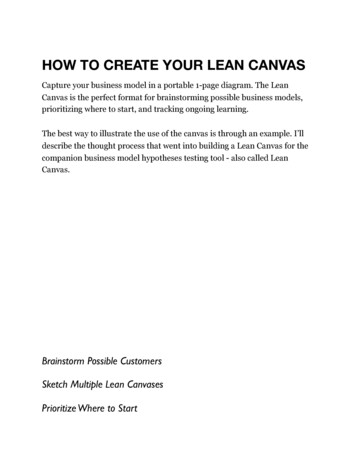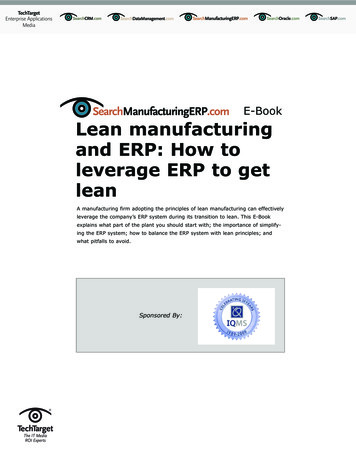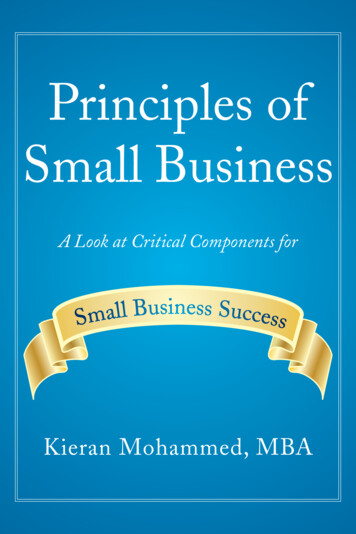
Transcription
Principles ofSmall BusinessA Look at Critical Components forKieran Mohammed, MBA
Principles ofSmall Business
Principles ofSmall BusinessA Look at Critical Componentsfor Small Business SuccessKieran Mohammed
Copyright 2013 by Kieran Mohammed.Library of Congress Control -4836-8577-9978-1-4836-8576-2978-1-4836-8578-6All rights reserved. No part of this book may be reproduced or transmittedin any form or by any means, electronic or mechanical, including photocopying,recording, or by any information storage and retrieval system,without permission in writing from the copyright owner.This book was printed in the United States of America.Rev. date: 09/09/2013To order additional copies of this book, contact:Xlibris 139239
ContentsPreface. 7Small-Business Success. 9Understanding the Cause of Small-Business Failure. 11Principles of Business Functionality. 14Critical Components in Action. 16Pearls of Wisdom. 18The Human Element and Decision Making. 21Business-Failure Theories and Today’s Businesses. 23Negativity Leads to Failure. 29Success or Survival?. 31Process. 36-Process Improvement. 38-Leadership and Management. 44Ethics. 46-Scope of Ethics. 47-Tools of Ethics. 48Strategy for Small Business. 50-Strategy for Success: Risk and Return on Investment. 51-Strength, Weakness, Opportunity, Threat (SWOT). 54
Financial Intelligence. 58-Business Economics. 59-Breakeven Analysis. 60-Financial Analysis. 61The Balanced Scorecard. 63Final Thoughts. 66Works Cited. 69Index. 71
PrefaceThis book is designed to assist the small-business owner andentrepreneur with decision making and principle building in order tosuccessfully start and run a small business. It applies decision-making analysisand demonstrates the value of four critical principles: process, strategy,financial intelligence (business economics and financial analysis), and ethicsand concisely explains their value to the small-business owner. The languageis simple and straightforward, with no requirement for prior experience orbusiness sense. It is written to assist the individual passionate about theirproduct or service but not acquainted with the technicalities of businessownership or the current business owner or manager struggling to overcomehurdles preventing growth and inflating cost.It provides useful definitions, comparisons, and rationale that will allowthe entrepreneur and small-business owner to understand the concepts andprinciples needed to establish a successful business.One of the key components to keep in mind when you read this bookis the mental approach with which you will be perceiving the information.This book seeks to engage the reader and begin the thought process. If youare already an established small-business owner OR If you already have anestablished small business, your thought process should be more directed tobusiness growth and success and, therefore, toward process improvement andstrategy; and if you are an entrepreneur, you will value the decision-makingfeatures and mental-preparation aspects within these pages as well as theprocess, strategy, ethics, and financial intelligence components. This book willbe valued by the first time-small business owner, entrepreneur, middle andupper management, as well as students, and those who have plateaued or arestruggling to transition from the survival to the success phase of business andare in need of simple, affordable guidance.7
Small-Business SuccessIt is not easy to turn a vision or dream into reality. There are coreconcepts and principles involved with starting, growing, and maintaininga small business successfully. Anyone with sufficient financing can starta business in theory, and many take the chance practically, only to runinto decision-making and business-management hindrances. It takes anunderstanding of critical business principles such as process, strategy, financialintelligence, and ethics to do it successfully.From a financial perspective, in its most basic form, a business canbe explained as simply using money to make money. From a strategicperspective, small business can be getting from where you are to where youwant to be. From a process perspective, a small business can be a series ofsteps performed to generate revenue. From an ethical standpoint, it can be away to bring needed goods and services to the community.The success of a small business is based on the various components ofhow efficient you can continuously produce, market, and sell your productor service. From these perspectives, it is important to understand thatowning and running a business are demanding and rewarding. Take thiscomparison for example: the top percentile of wealth in the world belongs toentrepreneurs; however, most of those in the working world are employees.Entrepreneurship does not provide the security of the corporate world. It doesnot come with the established entity or the organizational culture. All thishas to be built. It is the requirements of nurturing a business from start-up togrowth to maturity that make small-business ownership both rewarding andchallenging.People start business for various reasons but always for the intent ofmaking money. The reality of small-business ownership is that most that gotinto small-business ownership were not prepared to be small-business owners.They had the skill or the talent or the financing to start a business and were9
Kieran Mohammedseeking to exploit that to generate revenue but had no process, strategy, orrealistic vision of getting the desired result. A business built on poor processcan recover, but a business established on poor principle will fail.If the entrepreneur is going to succeed in small-business ownership,he needs to understand the fundamentals needed for success in thesmall-business world. He needs to understand process, strategy, financialintelligence, and ethics and their applications.10
Understanding the Causeof Small-Business FailureIf you’re going to succeed in small-business ownership, you mustunderstand what causes failure. Owning a business requires more goals fromthe entrepreneur than effectively securing the start-up funding. You mustefficiently be able to identify and address those areas that will affect yourbusiness’s success. There will continuously be ways to improve process andstrategy in order to succeed; and as such, as a small-business owner, you mustbe able to adjust your processes and strategy in an ethical and financiallysound manner. As technology advances, processes and strategy will surfacethat will allow for expansion into dimensions not previously explored.However, the principles of success will remain the same.Many of today’s small businesses are failing at an alarming rate and haveadopted a survival approach rather than one built for success. It is estimatedthat 50 percent of small businesses fail within five years. With all thesmall-business resources available today, why is this such an epidemic?It is imperative that the entrepreneur enters the business realm mentallyprepared with a sound process and strategy for the start and the short-termfuture. Short term for a new small-business owner suggests the next twelve tothirty-six months. Anticipation of hurdles and an assessment of the businessterrain are critical components of the initial planning process. To successfullynavigate this course, the entrepreneur or small-business owner must becompetent and a jack-of-all-trades seemingly. He must be a wizard almostto the point where he can foresee the future and make moves in anticipationof the forthcoming ebbs and flows of the market in order to gain the bestleverage. It seems almost like a fantasy approach, or is it just a matter ofprocess and strategy planning?11
Kieran MohammedBig businesses have been applying strategy, financial analysis, andprocesses to do just that. What is it that segregates these successes from thesmall businesses that fail? size? capital? resources? Logically, it seems that thehandicaps of a big business should be the advantages of a small business, andboth should have leverage to balance the other and share market space. It’sin the details of functionality and principles that we find the answer. Today’ssmall-business owner is too focused with fast money as the mission whilethe larger firms are built on longevity and leverage for market space. Thesmall-business owners of today are making more and more irrational decisionsbased on emotion and desperation and what they see others doing rather thanon process and strategy. They find themselves with high employee-turnoverrates, inefficient processes, poor strategy for success, and avoiding ethics as acost-saving strategy.While the small-business owner is thinking about making more money,the larger firms are thinking about gaining more customers and market shareand the criteria that affect that. In essence, they are both focused on the samegoal, but the strategy and process of them getting there are what make allthe difference. The larger entities see the direct relation between customersatisfaction, employee satisfaction, growth, and revenue and act uponthat relation while the small-business owner goes directly at the financialapproach, usually causing them to miss the opportunity, devalue their productor service, or miss the goal altogether.Once you realign the focus correctly, you realize that it’s the intent of thesmall-business owners, their own mission, and their goal setting of simplymaking money that are causing their demise. Nothing is wrong with theconcept of making money—it is why the business world exists; however, it isthe approach and application of this concept that create an issue. Is makingmoney the goal or the mission?The small-business owner starting with the wrong mentality is likeventuring on a great trip with the wrong map. Small businesses are startedmore with financial-oriented decisions than with process and strategy. Thesmall-business owners today get into business because they can afford to. Sothey get started by being focused on the financial start-up alone and hope tosucceed.That’s like having a weight-loss goal and buying the pills or the meals orthe gym membership and thinking that is sufficient.One simple approach is to bring the big business success mentality to thesmall-business owners along with some of the tools that will be effective inthe small-business market. Of course, this mentality and tool set needs to berepackaged to present value and compatibility to the small-business arena.This book endeavors to apply that repackaging to accommodate today’s12
Principles of Small Businesssmall-business owner. The mentality of the small-business owner has tobe focused on attaining and retaining customers, or market share as the bigfirms refer to this. When applying decision making, there is a tool already inexistence in journalism and legal review process that small-business ownersare definitely aware of and can harness to effectively make decisions. Youmight have heard of the five Ws and one H, or the who, what, why, when,where, and how.If small-business decisions are made by implementing these six questions,this tool will serve to slow down your thought process to consider all thevarious dimensions of the decision-making process. This is important insmall-business decision making. The discipline is that you need to make timefor this decision-making process and understand how critical it is to yoursuccess as a small-business owner.13
Principles of BusinessFunctionalityBusinessDictionary.com defines principles as “fundamental norms, rules,or values that represent what is desirable and positive for a person, group,organization, or community, and help it in determining the rightfulnessor wrongfulness of its actions. Principles are more basic than policy andobjectives, and are meant to govern both” and defines goal as “an observableand measurable end result having one or more objectives to be achievedwithin a more or less fixed timeframe.”It is important for business owners to understand the difference betweenprinciples and goals. Your business will be defined by your principles that youestablish, and the goals you set must be in compliance with those principles.When it comes to the other areas of functionality and execution ofdecisions and ideas, the focus should be heavily weighted on the principlesof customer satisfaction and value, utilizing the tools of process, strategy, andfinancial intelligence. All these tools should be governed by ethics. You wantto ensure your process, strategy, and financial intelligence are implementedand performed ethically for the sake of the business, customer, community,and cost.Some examples of simple tools to be able to have a working knowledge toassist in this preparation are the following:For financial intelligence: A budgetBusiness economics reports (micro and macro)Financial statements, such as balance sheets, income statements, andprofit and loss14
Principles of Small BusinessStrategy and process applications such as: Strength, weakness, opportunity, and threat analysis (SWOT)Root cause-analysis tools that include process mapping, fishbonediagramsSimple histograms for gauging production and usageEthical practices such as: Proper business documentation, such as licenses and permitsRecord keeping and qualified staffPolicy and procedure manualsThese tools and the understanding of their purpose and function ina small business would help you to lay out the initial road map called yourbusiness plan and guide you in making successful decisions and achievingthe overall mission of making money. These simple tools will assist inresolving many of the cost and performance issues you will encounter as asmall-business owner. Best of all, you can apply these tools with pen andpaper if you wish—extremely cost effective.15
Critical Componentsin ActionA Brief Analysis of Traditional Storefront Cell Phone Service Providers—Business-Functionality Proof of the Effect of Process, Strategy, FinancialIntelligence, and EthicsCell phone contracts seem very complicated, and many sales contracts arewritten in that manner purposely because the cell phone sales are in a fairlyfast-moving environment. Proper perusal and understanding of the contractterms may take a few hours at least, and you may have questions that the salesrepresentatives are not in the position to answer. For example, if you were toask a salesperson about the exclusive remedy clause in a contract, they maynot be able to provide any more information than what is already written.While taking the time to read a cell phone contract and digesting theparameters of the contract may help you decide if a plan is actually right foryou, the real reason you probably went to the vendor was the phone or thecost/service of your current carrier. The businesses in this industry are awareof the business market for these products, and they devise their marketingstrategy around displays and products to target these values to the customer.After all, you don’t see the contracts’ and plans’ details on display whenyou walk in the stores, right? Even with those prepaid plans available, thereis still the marketing strategy of pairing a plan with more tech-savvy andeye-catching phones while the terms and conditions to agree to in order toreceive those services take a backseat.The process that cell phone providers use is simple and effective. Theeye candy and technology of the cell phones are displayed with accessibility,allowing you to utilize your senses, thereby playing to your emotion; and theyare offered at a price point designed to be attractive and of value.16
Principles of Small BusinessThe service providers make many times over the cost they incurredthrough the monthly plan, and they know how to ensure they make theirforecasted sales by implementing certain parameters, such as a two-yearagreement with an early termination penalty or, in the no-contract services,mark up the up-front price of the phone and reduce the accessibility of theadditional features of a contractual plan. But where is the ethics in all this?Seemingly, I have pointed out adverse ethical practice in the overall schemeof marketing.The ethics is covered in the contract that you sign or in the terms andconditions of the prepaid plan. We are not focusing on the ethics of the salesstaff but rather on the ethics involved in the overall strategy and process.Sometimes the contract may come in electronic format; you know that boxthat you need to check “I Agree” that you scroll to the bottom area to sign?That’s you agreeing to the compliance, policy, and regulations aspects, whichmake all this ethical, provide parameters for you to abide by, and protect thevendor. So you see how effective their process, financial intelligence, ethics,and strategy work; and the cell phone industry is one that seems unaffectedby the economy even though specific components’ sales—such as phonebrands—seem to ebb and swell with the economy. The service providersthemselves have created a seemingly economy-proof market.Yet if we look at recent occurrences in the cell phone industry, we see thatsome companies rose and others fell. What impacted this rise and fall whenall carriers seemed to have competitive models and similar plans? Was it allabout price?At the end of the day, service boils down to customer satisfaction—whichservice was dependable in certain areas, who gave more value for the cost,etc. These fundamentals are consistent with the approach outlined in thisbook. Implement tools that promote quality in your process and product,spend time to devise an effective strategy that provides customers with value,ensure your price point promotes value as well as revenue, and make sureall components are ethically practiced and you will attain market share andlongevity. Focus on building market share, not making money.The small-business owner or entrepreneur should comprehend how theinteraction among decision making and understanding of the philosophiesand tools of process, strategy, ethics, and financial intelligence are essentialto be able to start, develop, and successfully maintain a small business. Toolsby themselves cannot get the job done. You will need to be an integral part ofyour business’s success. You will need to dedicate time, effort, resources, andrevenue.17
Pearls of Wisdom You get into business to make money—that’s the mission.Think about a soldier in charge of extracting someone behind enemylines. The extraction of the person is the mission, but the goals ofthat mission are what make the mission successful and of value—goin unnoticed, utilize proper equipment and personnel, bring everyoneback alive, get it done in under two hours, infiltrate at night, etc. Your business goal is to provide a quality product or service.In business, the goals are what you, the business owner, are focusedon. Setting simple and realistic goals using the process, strategy,financial intelligence, and ethics principles will simplify and organizeyour thought process and make goal setting, establishment, andenforcement more manageable. The customer is the boss; the customer can fire everyone by takingtheir business elsewhere (Sam Walton). The quality you put in yourproduct or service is the value it has to the customer.If your product or service does not provide a value to the customer,you are not going to stay in business for too long. Your service,product, policies, and procedures must have customer value built inin order to secure a long-term relationship. The only thing that’s constant is change.Today’s small business must be able to adapt and conform efficientlyto market changes. Remember awhile back when pagers were allthe rage? Business owners must embrace change instead of fight it.Business owners, employees, and processes must be developed to beable to adapt.18
Principles of Small Business Embrace technology; it is the most underused asset (primarily due tocost).Technology is an asset that can create market share for you inof itself. More customers turn to websites and social media forguidance on purchasing and purchasing itself. Then they use thissame technology to provide feedback, etc. If you do not harnessthese powerful outlets of marketing, you will handicap yourself. Inthe process aspect, technological tools can assist you with becomingefficient and more capable. I agree that it can be quite costly, but yourfinancial intelligence analysis will help you decide if the investment isworth the risk. Time is the only resource you cannot get back—don’t waste it.Crucial to anyone is time. Yet more of it is wasted than anyreplaceable resource. Time management is a key component ofefficiency; efficiency itself is a key product of lean process, and leanprocess is designed to cut productivity waste and reduce cost. So if weremove the middle components, we get the age-old business cliché oftime money. Begin with the end in mind (Stephen Covey).This is just common sense. If you don’t know where you’re going,then how would you know if you’re on the right path? You needto have more than hope. You need to have a plan and a strategy toexecute that plan. Hope is not a strategy. Your business plan andyour budget are tools that you should use as a compass to gauge yourcourse to your destination. Attitude is a little thing that makes a big difference (WinstonChurchill).If you say “I hope,” then you are leaving things to chance; butif you say “I will,” then you are making a statement of action. Astatement of action is extremely important for a business owner andentrepreneur, or else he becomes the owner of wishes and desires andnothing more. Your attitude as a business owner transcends to yourbusiness, and you should take that as a serious responsibility if youare to succeed. What is possible? What you will.If you persevere hard enough, you will attain your goals. You hearmany consultants talk about this effect where you want certain things19
Kieran Mohammedand, somehow, the universe aligns you up with them. Well, I believeit is your actions that line you up with those elements that youdesire, but it starts with you; you must begin with the sincere “I will”statements. Good things happen when planned; bad things happen on their own.Things fall apart when not planned properly—plain and simple. Less is more.I hesitated to include this one, because I envisioned everyprocrastinator reading this with a smile. What this means is, don’toverthink, overprocess, or overprepare, because then you begin tobecome rigid in your business structure; and referring to the bulletabove regarding change, you need to have outlets and avenuesto accommodate change built into your processes, systems, andstrategies. The philosophy here is like building such a disaster-proofsafe that you left out the door because it was a way in. Everything should be made as simple as possible but not simpler(Albert Einstein).Well, if Einstein said it, I am not going to try to explain it; butthink of his statement with the application of value and qualityand you’ll see one way of how to apply this to your small business.Another good quote for the business owner from Einstein is “Thesame mentality that causes a problem cannot be used to solve theproblem.”20
The Human Elementand Decision MakingAll the tools of success will not be of benefit unless proper decisionmaking is applied, and thus, the human element and the role it plays inattaining success must be explored.It starts with you, the business owner. Why do you want to start abusiness? Is the decision driven by the right motives? Only you can answerthese questions. Even though the banks, partners, and investors may ask thesequestions and you’ll google the perfect response for them to get the loan, etc.,the caveat is “to thine own self be true.”Forcing yourself into an emotional decision will put you at a severedisadvantage in that you may not be approaching this challenge with the rightmind-set. Remember, there is a lot of risk involved in the business ownershipdecision. Are you getting into business because you hate your current job andwould like to just make the same money you are making at your corporate jobby running your own business instead of working for that savage of a boss?Let’s run with that idea. Say, you make 50,000/year, and you want to make 50,000 baking cupcakes.Okay, you want to earn 50,000. What does it cost to make 50,000?Before you can make your first commercially produced cupcake, you need abusiness license and food inspection license, a location, and possibly, staff.There are your fixed assets: machinery, location, management salary, etc.Now what about variable assets or the assets that change as the volume ofproduction changes: hourly wages, raw materials, finished product packaging,etc.? Then there’s marketing, taxes, insurance, and—you get the idea. So inorder for you to make 50,000 of retained income, you may need to actuallymake about 100,000 in sales—that’s a lot of cupcakes!21
Kieran MohammedHuman beings are emotional beings first and logical decision makerssecond. We can be disasters to our business efforts with nothing to blamebesides our natural emotions and desires. This works for you as the businessowner in the marketing strategy, but it can work against you in processes andother business decision-making areas.Estimates from a local (Dover, Delaware), public volunteer small businesscounselor suggest about 85 percent of clients that approach them about smallbusiness are not ready to start a small business, 20 percent of those that areready actually complete the process, and less than 5 percent of those thatcomplete the process are successfully in operation after five years. Whatdoes this actually mean? Well, if you started with one hundred potentialsmall-business candidates, only fifteen would actually be ready to start a newbusiness. Of that fifteen, only three would actually complete the process, andapproximately one (it’s actually 0.15).Most businesses will spend about 30-33 percent of time/earnings onfixing problems and correcting errors (QI Macros consultant).Fifty percent of all new businesses fail in their first five years (SBA.gov).22
Business-Failure Theoriesand Today’s BusinessesMichael Ames, author of Small Business Management (Ames and Wellsfry1983), gave the following reasons in his book back in 1983. Let’s see howthey apply to today’s business and what tools or areas of the process, strategy,financial intelligence, and ethics may apply:1. Lack of experience (inability to implement proper process, strategy,and business economics)I would adjust this in the context of this book to focus on thelack of experience to make proper decisions. You may have hadfour years of culinary school and make a mean cupcake, but that’snot the experience I want to focus on here. The planning, strategy,and business economics knowledge will be essential in the properdecision making. Every business owner needs to make decisions;these decisions will impact the business. It is imperative that yourecognize the need for time and process in decision making toensure you make the right decisions. Sometimes, knowing what youdon’t know is the key to actually making the right choices. Makingdecisions on emotional whim is a key attribute that lack of experiencedemonstrates.2. Insufficient capital (business economics)Traditionally, you needed capital (money); but as of recent, you arequite aware that businesses such as Facebook and UPS had veryhumble beginnings. Ideas sell big in today’s market, and capital canbe controlled to a certain point by proper planning and strategy.There are many ways to get started in today’s business world; but23
Kieran Mohammedmore important, I think, is the ability to continue to generate income,especially to hit that critical break-even
The small-business owner starting with the wrong mentality is like venturing on a great trip with the wrong map. Small businesses are started more with financial-oriented decisions than with process and strategy. The small-business owners today get into business because they can afford to. So
